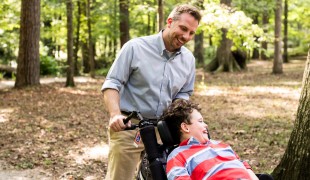- 6881
- 218
- 13
- 10
- 0
- Help Ukraine
About the solution
In 2021, Xu Wei from Kunming, China, faced a desperate situation when his 2 year old son, Haoyang, was diagnosed with Menkes Syndrome—a rare genetic disorder that affects how the body uses copper, which is essential for brain and nervous system development. It occurs in about 1 in 100k births worldwide, and children with the disease typically don't live beyond 3 years, making Haoyang’s prognosis very bleak.
Treatment options for Menkes Syndrome, such as copper histidine, were not available in China. The COVID-19 pandemic made it even harder to seek medical treatment abroad due to travel restrictions. Determined to save his son, Xu Wei, who had only a high school education, turned his father’s gym into a DIY laboratory. Using translation software, he carefully studied English-language medical documents to learn how to prepare copper histidine by mixing copper chloride dihydrate, histidine, sodium hydroxide, and water. After thorough testing, including trials on rabbits and self-administration, and despite skepticism from friends and the inherent risks, Xu began treating Haoyang. Within two weeks, some improvement was seen in his son's condition. However, copper histidine could only reduce symptoms instead of curing the disease because it could not effectively transport copper ions to the brain.
Undeterred, Xu Wei continued his efforts to create elesclomol, aiming to improve the delivery of copper ions to the brain. He also looked into gene therapy by sending Haoyang’s stem cells for testing. Despite his relentless work, Xu Wei faced significant financial difficulties, relying on savings, credit cards, and loans to keep his laboratory running.
Xu’s innovative efforts gained international attention, leading to a partnership with VectorBuilder Inc., a global leader in gene delivery technologies, and Lantu Biopharma. On August 23, 2022, VectorBuilder and Lantu announced the first human trial of a new gene therapy drug candidate, LTGT06, for Menkes disease. This adeno-associated virus (AAV)-based therapy was given to Haoyang shortly after his third birthday, marking an important step forward in his treatment.
Despite these advancements, the long-term outcomes of Xu Wei’s efforts remain unknown. As of the latest reports, there have been no further updates on Haoyang’s progress or the broader impact of the gene therapy trial. Xu’s relentless pursuit highlights the urgent need for better support systems and treatment options for rare diseases in developing countries.
This story is based on media reports from 2021 and 2022. There have been no subsequent updates on the outcomes of Xu Wei’s treatment efforts as of now.
Adapted from:
https://www.euronews.com/health/2021/11/25/this-father-created-a-home-la...
https://en.vectorbuilder.com/about-us/newsroom/vectorbuilder-supports-fi....
https://www.youtube.com/watch?v=nQQQ5p7Sum0
This solution shall not include mention to the use of drugs, chemicals or biologicals (including food); invasive devices; offensive, commercial or inherently dangerous content. This solution was not medically validated. Proceed with caution! If you have any doubts, please consult with a health professional.
DISCLAIMER: This story was written by someone who is not the author of the solution, therefore please be advised that, although it was written with the utmost respect for the innovation and the innovator, there can be some incorrect statements. If you find any errors please contact the patient Innovation team via info@patient-innovation.com
-
-
789
-
0
-
11948

Ava the Elephant – Medicine dispenser for children
SWALLOWING: Swalling food and liquids
CAREGIVING
Down Syndrome (Trisomy 21)
Neuromuscular Disorders
Treatment/Surgical device
Pharma
Strategy/Tip
Vision problems
Difficulty coordinating movements
Muscle weakness
Trouble with fine motor skills (e.g., writing, buttoning clothes)
Cognitive impairment
Memory loss
Confusion
Anxiety
Hearing loss or ringing in the ears (tinnitus)
Mood swings
Manage Medication
To improve Treatment/Therapy
Caregiving Support
General and Family Medicine
Medical Genetics
Neurology
Pediatrics
United States
-
-
-
546
-
0
-
8586

Parents help to invent treatment for her daughter’s rare disease
CAREGIVING
Spinal Cord and Nerve Root Disorders
Cerebral Palsy
Neuromuscular Disorders
Pharma
Treatment/Surgical device
Muscle cramps or spasms
Difficulty coordinating movements
Stiffness or rigidity (difficulty moving)
Paralysis of the legs and lower body
Muscle weakness
Cognitive impairment
Sleep disturbances
Managing Neurological Disorders
To improve Treatment/Therapy
Caregiving Support
Medical Genetics
Neurology
Pediatrics
France
-
-
-
518
-
0
-
8449

Father creates treatment for his son’s rare disease
CAREGIVING
Cartilage Development Disorder
Neuromuscular Disorders
Cerebral Palsy
here
Treatment/Surgical device
Difficulty walking or moving
Muscle weakness
Muscle cramps or spasms
Difficulty coordinating movements
Stiffness or rigidity (difficulty moving)
Paralysis of the legs and lower body
Limited range of motion
Muscle pain or stiffness
Cognitive impairment
Joint deformity
Seizures
Fatigue
To improve Treatment/Therapy
Caregiving Support
Medical Genetics
Neurology
Pediatrics
United States
-
 en
en